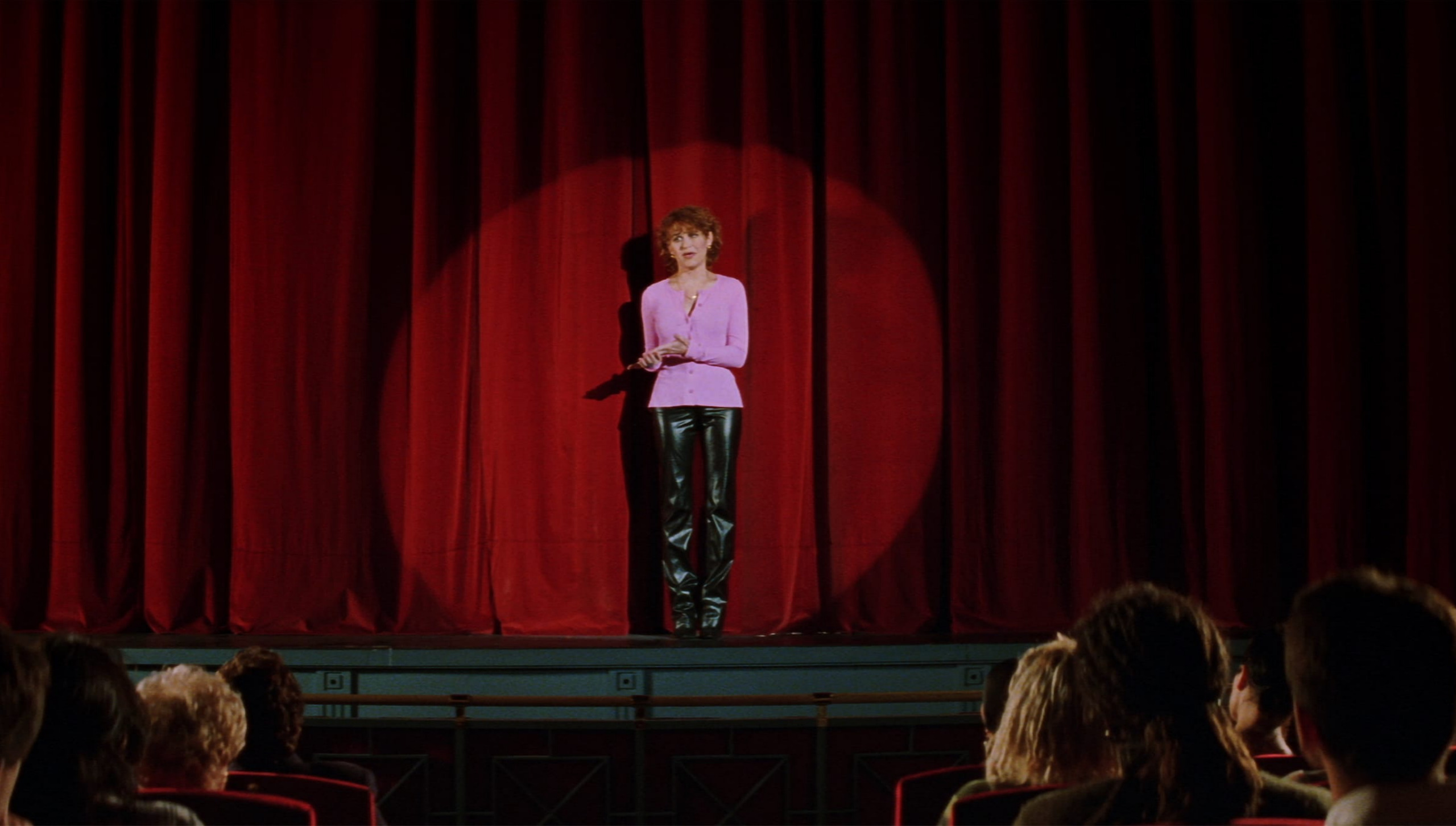Whether it represents her son’s fantasy or her own story, the film attends very closely to Manuela’s emotions, her decision to follow her son’s heart to its new recipient, and then her departure from Madrid for Barcelona, where her son was conceived. The high-speed train ride, a motif in the film, offers a long tunnel like a cocoon, a space of numbness—Almodóvar shows grief as an emptying, a new departure. The first images of Barcelona are ecstatic aerial shots of the evening city, irradiated by the swirling music of the song “Tajabone,” by the Senegalese musician Ismaël Lô. This was Almodóvar’s first film set and shot here. The Barcelona scenes, which make up most of the movie’s remainder, have an unreal loveliness, a giddiness that recalls some of Almodóvar’s more glamorous, insane earlier work—Carmen Maura, another of his favorite actors, walking the night streets of Madrid (Almodóvar’s home city and a frequent backdrop for his films) in Law of Desire (1987), or contemplating suicide in a vibrantly colored apartment in Women on the Verge of a Nervous Breakdown (1988). The move to Barcelona in All About My Mother signals a change in time and style, allowing a shift in feeling, a revival of Manuela’s shimmering memories of La Barceloneta and her love for Lola, Esteban’s transfeminine father. In Barcelona, other women become part of Manuela’s story, and the film opens to other memories.
Almost fulfilling what her son had imagined, Manuela is mistaken for a prostitute when she and a friend of hers from the past, Agrado (Antonia San Juan), a transgender sex worker, go to look for work with the help of the nun Rosa (Penélope Cruz). Before long, Manuela seeks out Huma Rojo—again buying tickets for A Streetcar Named Desire, which has come to Barcelona from Madrid, and sitting with a seat for her son empty beside her—and begins acting as an assistant to the glamorous performer, buttoning her sleeves, pouring tea just before the intermission of her play. And Manuela takes into her house Sister Rosa, who recently had sex with Lola (Toni Cantó) while helping her through rehab, and who is pregnant with Lola’s baby. When Rosa learns that, like Lola, she is HIV-positive, Manuela takes her in her arms, and Rosa weeps convulsively, like a child.
Manuela creates in Barcelona a makeshift family, a passionate group of female-identified friends. Agrado affords a link to her past, a time before Esteban, and San Juan’s playful performance brings humor into the film. With Huma, whom we see as Blanche DuBois and as a bereaved mother in a play by Federico García Lorca, Manuela revisits her own dreams of being an actor. (The part of Huma is grippingly played by Paredes, who is also stunning as the abandoned novelist Leo in The Flower of My Secret; here again her character is blissfully elegant in designer clothes, long-legged, a brilliant actor but needy, generous, tortured in love.) Manuela plays a vital supportive role to the women around her, taking Agrado to the night pharmacy after she has been beaten up, locating Huma’s girlfriend and costar Nina (Candela Peña) on the streets buying drugs. She revisits her past self, her years of being young, in her friendships, but she also evinces a maternal toughness that is part of the film’s optic on motherhood. She displays this quality most clearly with Rosa, caring first for her and then finally, though at first reluctantly, for her son, whom Rosa names Esteban before dying in childbirth.
But until those final
stretches of the film, the candid, pristine Rosa follows Manuela around like a
little sister. Rosa is estranged from her own mother, another blonde figure,
and her father is also missing, lost in dementia. Played by the veteran actor
Fernando Fernán Gómez, who starred in films of the seventies by Víctor Erice
and Carlos Saura, the amnesiac father is a reminder of the Spain of Franco and
the traumatic hole that period left in so many families’ histories. On her way
to the hospital to give birth, Rosa asks to stop in the Plaça del Duc de
Medinaceli, near which she used to live. Here Cruz, fragile and tearful,
physically resembles Geraldine Chaplin in her parts for Saura. In this square
of childhood memories, Rosa glimpses the family dog, Sapic, and clasps him,
soft, full of hair, in her arms. The dog knows her, making her father’s words,
as he approaches and addresses her as a stranger, all the more painful. Cruz’s
face carries the emotion of the scene perfectly.



